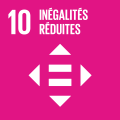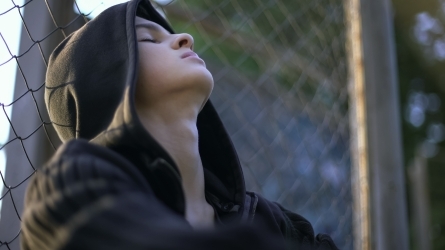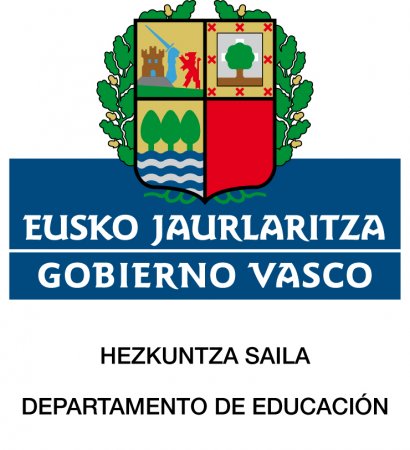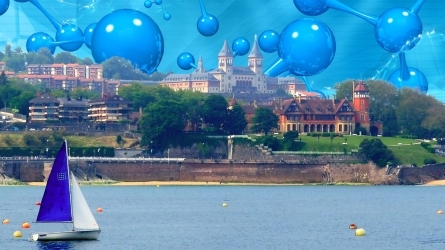Adolescencia y problemas de conducta: las personas menores ante la Justicia
Centros de reforma, protección y salud mental
Description
La Ley Orgánica de Responsabilidad penal del menor, pese a llevar 22 años en vigor, resulta desconocida en todos los ámbitos, incluido el universitario. Dar a conocerla es el principal objetivo de este Curso de Verano.
Se analizará la evolución de la tipología delictiva en el ámbito del territorio vasco, en los últimos 22 años, debatiendo la influencia de las nuevas tecnologías en tipos penales como el acoso escolar, o el consumo de pornografía infantil, con la mirada puesta en el centro de reforma Ibaiondo.
En este Curso someteremos a debate el papel de la salud mental en la juventud y de las situaciones de desprotección como condicionantes del binomio victima-agresor.
Además, se analizarán las diferencias entre centros de reforma y centros de protección y el diferente papel de cada uno de ellos, así como de los centros de protección públicos y privados.
Objectives
Dar a conocer el procedimiento de menores.
Mostrar la diferencia entre reforma y protección y los diferentes tipos de centros, así como las necesidades y requisitos para ingresar en ellos.
Activity directed to
- All public
- University student
- Students not from university
- Teachers
- Professionals
- Trabajadores y Educadores Sociales, Personal sanitario
In collaboration with
Program
19-06-2023
“Registro / Erregistroa“Presentation by the Director of the activity
Problemas de conducta en la adolescencia
- Mercedes Bautista Vázquez | Fiscalia de gipuzkoa - Teniente Fiscal
Institutional Opening session. Speaking order:
Justicia juvenil: reforma y proteccion
- Carmen Adán del Río | Fiscal Superior del País Vasco
- Nerea Melgosa Vega | Gobierno Vasco / Eusko Jaurlaritza - Consejera de Igualdad, Justicia y Políticas Sociales
“Investigacion penal de los delitos juveniles. Justicia restaurativa. “
La doble faceta del fiscal: instructor-protector
- Raquel Fernández Leiras | Fiscalia de gipuzkoa - Fiscal del Menores
“Evolucion de la criminalidad en la justicia juvenil desde la perspectiva de una juez de menores“
Peculiaridades de la ejecucion penal
- Sara Mallen Basterra | Judicatura - Magistrada de menores
“Centro de internamiento Ibaionado, 20 años después“
Medida de internamiento: reeducacion o castigo?
- Eva Ammann Debont | Gobierno Vasco - psicologa
Round table: “Dificultades en la ejecucion de medidas no privativas de libertad“
Tipos de medidas no privativas.
- Patxi López Cabello | Gobierno Vasco - Ex- jefe de servicio de justicia juvenil en el país vasco
- Eduardo Cabrera Serrano | Berriztu - Responsable ambito justicia juvenil
20-06-2023
“ El papel del Equipo Tecnico en la Ley del menor“
Equipo tecnico y justicia restaurativa
- Fernando Álvarez Ramos | Gobierno Vasco - Coordinador equipo tecnico país vasco
Round table: “Jovenes tutelados ante la justicia: recursos residenciales“
Es un centro de acogida un orfanato?
- María Guadalupe Imaz Bienabe | Diputacion Foral - Asesora legal de la Diputacion Foral de Gipuzkoa
Que distingue al centro de reforma de un centro de proteccion
- Patxi López Cabello | Gobierno Vasco - Ex-Jefe de justicia juvenil
Round table: “La salud mental infanto-juvenil a debate“
Enfermedad o disfunción socio-familiar
- Begoña Antúnez María | Hospital Universitario de Donostia - Psiquiatra
Programas de atención a los diferentes trastornos de conducta para jovenes tutelados.
- Maitane Cárcamo Orive | Diputacion Foral de Guipuzkoa - Psicologa
Directors

Mercedes Bautista Vázquez
Teniente Fiscal
Prosecutor in Gipuzkoa since 1993. She has worked in specialised areas such as gender violence, immigration, l. Level of French C1.minors and international cooperation. She has tutored law school students, lawyers and prosecutors. She has given courses to civil servants on minors and mediation. She has given talks in schools on bulling. She has participated in specialisation courses on minors at the Gipuzkoa Bar Association. She has taken part in the drawing up of protocols on Menas at provincial level, and on sexual violence in childhood at autonomous level. She has appeared in the Basque Parliament to speak on the content of the latter protocol.
Speakers

Carmen Adán del Río
Fiscal Superior del País Vasco, Vocal de la Comisión de Videovigilancia y Libertades del País Vasco
Senior Prosecutor of the Public Prosecutor's Office of the Basque Country, in his second term of office. Formerly Chief Prosecutor of Bizcaia. Delegated prosecutor for the protection of victims. And delegated prosecutor for minors and specialist in economic law. Senior Prosecutor of the Public Prosecutor's Office of the Basque Country, in her second term of office. Formerly Chief Prosecutor of Bizcaia. Delegated prosecutor for the protection of victims. And delegated prosecutor for minors and specialist in economic law. Senior Prosecutor of the Public Prosecutor's Office of the Basque Country, in her second term of office. Formerly Chief Prosecutor of Bizcaia. Delegated prosecutor for the protection of victims. And delegated prosecutor for minors and specialist in economic law.

Fernando Álvarez Ramos
Equipo Psicosocial Judicial. Dpto de Igualdad, Justicia y Políticas Sociales. Gobierno Vasco., Coordinador
Degree in Psychology and FICE-Pedagogy (Univ. of the Basque Country). Qualified General Health Psychologist. Expert in Legal Psychology and Forensic Psychology accredited by the General Council of Psychology Colleges of Spain. Educator of the Technical Team of the Juvenile Court Judicial Psychosocial Team of Donostia from 1991 to 2010, with functions in Juvenile Justice. From 2010 to 2014 Forensic Psychologist of the Administration of Justice with assignment at the Basque Institute of Legal Medicine and functions in the Criminal field. From 2014 to the present: Coordinator of the Judicial Psychosocial Team of the Basque C.A. (Dept. of Equality, Justice and Social Policies. Basque Government) with functions of Team Coordination and Forensic Psychologist in the field of Family (evaluation of child custody), Juvenile Offenders (Counseling and Mediation) and Criminal (obtaining and assessment of vulnerable testimonies and associated expert reports). Participates in several courses and publications
Eva Ammann Debont
Psychologist of Penitentiary Institutions. Responsible for social affairs area of the Department of Justice, responsible for education in Ibaiondo, project manager of treatment of sexual assault crimes in Nanclares de la Oca, teacher in various institutions, advisor to the Basque Government in various projects, collaborator with the Government of Guatemala in the project of treatment of young people in conflict with criminal law, and prison treatment in prisons in Guatemala.

Begoña Antúnez María
Osakidetza
Specialist in child and adolescent psychiatry in Burgos and currently at the University Hospital of Donostia. Doctoral thesis on "suicidal and parasuicidal behaviour", master's degree in "analytical group psychotherapy", expert in "child and adolescent psychiatry" and "ADHD throughout life".

Eduardo Cabrera Serrano
Berriztu
Degree in pedagogy and social educator. He has been part of the Berriztu Association since its foundation in 1991, playing professional roles as educator, coordinator, responsible for the internment center and finally responsible for the juvenile justice area of the association. During this period he has participated in the creation and management of the different alternatives of help in this area, educational centers, autonomy residences, day centers and open environment teams.

Maitane Cárcamo Orive
GIPUZKOAKO FORU ALDUNDIA
Degree in Psychology. Higher Technician in Social Integration. Work experience in the Child and Adolescent Care Service of the Provincial Council of Guipuzkoa, Service for Dependency and Disability Care. Specialised in family and residential foster care.
Raquel Fernández Leiras
She has a double degree in law and political science, an award for excellence, and is a prosecutor in the Irun courts, a prosecutor for minors and a prosecutor for international cooperation. She has given talks in schools of bullying and has participated in the training of teachers to detect bullying. Level C1 in English and A 1 in French and Basque.

María Guadalupe Imaz Bienabe
Abogada
Practising lawyer. She has been working for the Child Protection Service of the Provincial Council of Guipuzkoa since 1998. Legal advisor to private entities that intervene in the field of Social Services. Member of the Ethics Committee for Social Intervention in Gipuzkoa and of the Commission for the Guarantee and Evaluation of Euthanasia in the Basque Country. Speaker at courses on the legal framework for the protection of children and on the autonomy of persons in the field of Social Services.

Patxi López Cabello
Eusko Jaurlaritza
Degree in Psychology. Responsible until 2023 of the Juvenile Justice Service and Family Meeting Points of the Basque Government. Technical responsible for the juvenile justice plans of the Basque Government.
Sara Mallen Basterra
Magistrate of the Juvenile Court of Vitoria. Previously a magistrate in the Juvenile Court of San Sebastian. She has worked in several examining courts and criminal courts, given lectures at the Vitoria and San Sebastian Bar Associations and participated in working groups on sexual abuse in childhood. C1 in English and A2 in Basque.
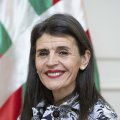
Nerea Melgosa Vega
diputación Foral Alava
Consejera del Departamento de Igualdad, Justicia, y Politicas Sociales. Licenciada en Sociologia y Ciencias Politicas. Master en Recursos Humanos. Especializacion universitaria en cooperativas y mercado.
Registration fees
| Face-to-face | Until 31-05-2023 | Until 19-06-2023 |
|---|---|---|
| 25,00 EUR | 59,00 EUR | |
| - | 84,00 EUR | |
| - | 71,00 EUR | |
| - | 59,00 EUR |
| Live online | Until 31-05-2023 | Until 19-06-2023 |
|---|---|---|
| 25,00 EUR | 59,00 EUR | |
| - | 84,00 EUR | |
| - | 71,00 EUR | |
| - | 59,00 EUR |
Venue
Miramar Palace
Pº de Miraconcha nº 48. Donostia / San Sebastián
Gipuzkoa
Miramar Palace
Pº de Miraconcha nº 48. Donostia / San Sebastián
Gipuzkoa
Sustainable development goals
Agenda 2030 is the new international development agenda approved in September 2015 by the United Nations. This agenda aims to be an instrument to favour sustainable human development all over the planet, and its main pillars are the eradication of poverty, a reduction in equality and vulnerability and fostering sustainability. It is a unique opportunity to transform the world up to 2030 and guarantee human rights for all.

4 - Quality education
Guarantee quality education that is inclusive and equitable and foster opportunities for lifelong learning for everyone. Key issues: free-of-charge, equitable and quality education, access to higher education and training on an equal basis, education for sustainable development, suitable education centres for persons with disabilities, and safe, non-violent and efficient learning environments.
More information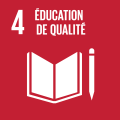
5 - Gender equality
Achieve gender equality and empower all women and young girls. Key issues: the end of all forms of discrimination and violence, recognition of unpaid care and domestic work, shared responsibility, equal opportunities, full and effective participation in reproductive rights, equal rights vis-à-vis economic resources, access to land and other assets and ownership.
More information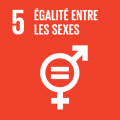
10 - Reduced inequalities
Reduce inequality in countries and between them. Key issues: promotion of the social, economic and political inclusion of all people, equal opportunities, fiscal, wage and social protection policies to favour equality, migration and the policies that affect it, official assistance for the development, regulation and supervision of world institutions and markets.
More information